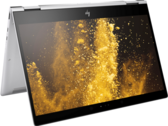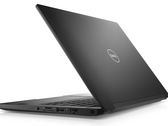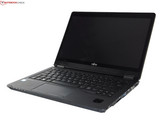
Test HP EliteBook x360 1020 G2 (i7-7600U, FHD Sure View) Convertible
Intel Core i7-7600U | Intel HD Graphics 620 | 12.50" | 1.1 kg

Der Intel Core i7-7600U ist ein schneller Dual-Core-SoC für Note- und Ultrabooks, der auf der Kaby-Lake-Architektur basiert und Anfang Jänner 2017 vorgestellt wurde. Die CPU integriert 2 Prozessorkerne, die mit 2,8 bis 3,9 GHz takten (2-Kern-Turbo ebenfalls 3,9 GHz). Dank Hyper-Threading kann der Prozessor vier Threads gleichzeitig bearbeiten. Weiterhin integriert der i7-7600U eine Intel HD Graphics 620 Grafikkarte, einen Dual-Channel-Speichercontroller (DDR4) sowie VP9- und H.265-Videode- und -encoder. Die Fertigung erfolgt weiterhin in einem 14-Nanometer-Prozess mit FinFET-Transistoren.
Im Vergleich zum bisherigen Dual-Core Spitzenmodell, dem Core i7-7500U bietet der 7600U eine 100 MHz höhere Basistaktfrequenz und einen 400 MHz höheren Turbo. Auch die HD 620 ist um 100 MHz im Maximaltakt schneller.
Architektur
Im Vergleich mit Skylake hat Intel die zugrundeliegende Mikroarchitektur praktisch unverändert übernommen, sodass sich keine Unterschiede in der Pro-MHz-Leistung ergeben. Überarbeitet wurde lediglich die Speed-Shift-Technik zur schnelleren dynamischen Anpassung von Spannungen und Taktraten, zudem gestattet der gereifte 14-Nanometer-Prozess deutlich höhere Frequenzen und eine bessere Energieeffizienz als bislang.
Performance
Mit 2,8 bis 3,9 GHz taktet der Core i7-7600U deutlich höher als die Vorgänger i7-6500U (2,5 - 3,1 GHz) und i7-7500U (2,7 - 3,5 GHz), was je nach Turbo Ausnutzung deutliche Performancezuwächse mit sich bringt. Dadurch sollte er den alten Core i7-6567U deutlich abhängen (bei Ausnutzung des vollen TDP) und Anfang 2017 der schnellste mobile Dual-Core-Prozessor sein.
Grafikeinheit
Die integrierte Intel HD Graphics 620 Grafikkarte verfügt wie die alte HD Graphics 520 über 24 Ausführungseinheiten (EUs) und taktet in diesem Fall mit 300 bis 1.150 MHz. Die Performance hängt stark vom verwendeten Arbeitsspeicher ab; mit schnellem DDR4-2133 im Dual-Channel-Betrieb wird der Vorgänger um etwa 20 bis 30 Prozent übertroffen und die HD 620 kann sich mit einer dedizerten Nvidia GeForce 920M messen.
Anders als Skylake kann Kaby Lake nun auch H.265/HEVC im Main10-Profil mit 10 Bit Farbtiefe sowie Googles VP9-Codec in Hardware decodieren. Die Anfang Jänner eingeführten Dual-Core-Kaby-Lake-Prozessoren sollten außerdem schon HDCP 2.2 beherrschen.
Leistungsaufnahme
Die Fertigung erfolgt in einem weiter verbesserten 14-Nanometer-Prozess mit FinFET-Transistoren, wodurch die Energieeffizienz nochmals spürbar gestiegen ist. Die TDP wird ULV-typisch mit 15 Watt spezifiziert und kann je nach Einsatzzweck zwischen 7,5 (cTDP Down) und 25 Watt variiert werden.
| Codename | Kaby Lake | ||||||||||||||||||||||||||||||||||||||||||||||||||||||||||||||||||||||||||||||||||||||||||||||||||||||||||||||||||||||||||||||||||||||||||||||||||||||||||||||||||||||||
| Serie | Intel Kaby Lake | ||||||||||||||||||||||||||||||||||||||||||||||||||||||||||||||||||||||||||||||||||||||||||||||||||||||||||||||||||||||||||||||||||||||||||||||||||||||||||||||||||||||||
Serie: Kaby Lake Kaby Lake
| |||||||||||||||||||||||||||||||||||||||||||||||||||||||||||||||||||||||||||||||||||||||||||||||||||||||||||||||||||||||||||||||||||||||||||||||||||||||||||||||||||||||||
| Taktung | 2800 - 3900 MHz | ||||||||||||||||||||||||||||||||||||||||||||||||||||||||||||||||||||||||||||||||||||||||||||||||||||||||||||||||||||||||||||||||||||||||||||||||||||||||||||||||||||||||
| Level 1 Cache | 128 KB | ||||||||||||||||||||||||||||||||||||||||||||||||||||||||||||||||||||||||||||||||||||||||||||||||||||||||||||||||||||||||||||||||||||||||||||||||||||||||||||||||||||||||
| Level 2 Cache | 512 KB | ||||||||||||||||||||||||||||||||||||||||||||||||||||||||||||||||||||||||||||||||||||||||||||||||||||||||||||||||||||||||||||||||||||||||||||||||||||||||||||||||||||||||
| Level 3 Cache | 4 MB | ||||||||||||||||||||||||||||||||||||||||||||||||||||||||||||||||||||||||||||||||||||||||||||||||||||||||||||||||||||||||||||||||||||||||||||||||||||||||||||||||||||||||
| Anzahl von Kernen / Threads | 2 / 4 | ||||||||||||||||||||||||||||||||||||||||||||||||||||||||||||||||||||||||||||||||||||||||||||||||||||||||||||||||||||||||||||||||||||||||||||||||||||||||||||||||||||||||
| Stromverbrauch (TDP = Thermal Design Power) | 15 Watt | ||||||||||||||||||||||||||||||||||||||||||||||||||||||||||||||||||||||||||||||||||||||||||||||||||||||||||||||||||||||||||||||||||||||||||||||||||||||||||||||||||||||||
| Herstellungstechnologie | 14 nm | ||||||||||||||||||||||||||||||||||||||||||||||||||||||||||||||||||||||||||||||||||||||||||||||||||||||||||||||||||||||||||||||||||||||||||||||||||||||||||||||||||||||||
| Max. Temperatur | 100 °C | ||||||||||||||||||||||||||||||||||||||||||||||||||||||||||||||||||||||||||||||||||||||||||||||||||||||||||||||||||||||||||||||||||||||||||||||||||||||||||||||||||||||||
| Socket | BGA1356 | ||||||||||||||||||||||||||||||||||||||||||||||||||||||||||||||||||||||||||||||||||||||||||||||||||||||||||||||||||||||||||||||||||||||||||||||||||||||||||||||||||||||||
| Features | Dual-Channel DDR4 Memory Controller, HyperThreading, AVX, AVX2, Quick Sync, Virtualization, AES-NI | ||||||||||||||||||||||||||||||||||||||||||||||||||||||||||||||||||||||||||||||||||||||||||||||||||||||||||||||||||||||||||||||||||||||||||||||||||||||||||||||||||||||||
| GPU | Intel HD Graphics 620 (300 - 1150 MHz) | ||||||||||||||||||||||||||||||||||||||||||||||||||||||||||||||||||||||||||||||||||||||||||||||||||||||||||||||||||||||||||||||||||||||||||||||||||||||||||||||||||||||||
| 64 Bit | 64 Bit wird unterstützt | ||||||||||||||||||||||||||||||||||||||||||||||||||||||||||||||||||||||||||||||||||||||||||||||||||||||||||||||||||||||||||||||||||||||||||||||||||||||||||||||||||||||||
| Architecture | x86 | ||||||||||||||||||||||||||||||||||||||||||||||||||||||||||||||||||||||||||||||||||||||||||||||||||||||||||||||||||||||||||||||||||||||||||||||||||||||||||||||||||||||||
| Anfangspreis | $393 U.S. | ||||||||||||||||||||||||||||||||||||||||||||||||||||||||||||||||||||||||||||||||||||||||||||||||||||||||||||||||||||||||||||||||||||||||||||||||||||||||||||||||||||||||
| Vorgestellt am | 03.01.2017 = 3035 days old | ||||||||||||||||||||||||||||||||||||||||||||||||||||||||||||||||||||||||||||||||||||||||||||||||||||||||||||||||||||||||||||||||||||||||||||||||||||||||||||||||||||||||





Lenovo ThinkPad P51s 20HB000SGE: NVIDIA Quadro M520, 15.60", 2.2 kg
Test » Test Lenovo ThinkPad P51s (Core i7, 4k) Workstation
Lenovo ThinkPad X1 Yoga 2017 20JES03T00: Intel HD Graphics 620, 14.00", 1.4 kg
Test » Test Lenovo ThinkPad X1 Yoga 2017 (Core i7, OLED) Convertible
Lenovo ThinkPad T470s-20HGS00V00: Intel HD Graphics 620, 14.00", 1.4 kg
Test » Lenovo ThinkPad T470s – Welches Display sollte man nehmen?
Fujitsu Lifebook T937: Intel HD Graphics 620, 13.30", 1.4 kg
Test » Test Fujitsu Lifebook T937 (i7, 512GB) Convertible
Dell Latitude 12 5285 2-in-1: Intel HD Graphics 620, 12.30", 1.2 kg
Test » Test Dell Latitude 12 5285 2-in-1 Convertible
Dell Latitude 5480: Intel HD Graphics 620, 14.00", 1.8 kg
Test » Test Dell Latitude 5480 (7600U, FHD) Laptop
Dell Latitude 7480: Intel HD Graphics 620, 14.00", 1.5 kg
Test » Test Dell Latitude 7480 (7600U, FHD) Laptop
Dell Latitude 7280: Intel HD Graphics 620, 12.50", 1.3 kg
Test » Test Dell Latitude 7280 (7600U, Full-HD) Laptop
Toshiba Portege X20W-D-10R: Intel HD Graphics 620, 12.50", 1 kg
Test » Test Toshiba Portégé X20W (7600U, 512 GB) Convertible
Lenovo ThinkPad T470s-20HGS00V00: Intel HD Graphics 620, 14.00", 1.4 kg
Test » Test Lenovo ThinkPad T470s (Core i7, WQHD) Laptop
Fujitsu Lifebook U727 vPro: Intel HD Graphics 620, 12.50", 1.1 kg
Externer Test » Fujitsu Lifebook U727 vPro
HP EliteBook x360 1020 G2: Intel HD Graphics 620, 12.50", 1.1 kg
Externer Test » HP EliteBook x360 1020 G2
HP ZBook x2 G4-3FB86UT: NVIDIA Quadro M620, 14.00", 2.2 kg
Externer Test » HP ZBook x2 G4-3FB86UT
HP ZBook 14u G4-2FH00AW: AMD FirePro W4190M, 14.00", 1.6 kg
Externer Test » HP ZBook 14u G4-2FH00AW
Lenovo ThinkPad X1 Carbon 20HR006SUS: Intel HD Graphics 620, 14.00", 1.1 kg
Externer Test » Lenovo ThinkPad X1 Carbon 20HR006SUS
Dell Latitude 13 7389-CTO4738913US: Intel HD Graphics 620, 13.30", 1.4 kg
Externer Test » Dell Latitude 13 7389-CTO4738913US
Dell Latitude 14 7480-8685: Intel HD Graphics 620, 14.00", 1.4 kg
Externer Test » Dell Latitude 14 7480-8685
Dell Latitude 13 7380: Intel HD Graphics 620, 13.30", 1.3 kg
Externer Test » Dell Latitude 13 7380
HP EliteBook x360 1030 G2-1EN97EA: Intel HD Graphics 620, 13.30", 1.3 kg
Externer Test » HP EliteBook x360 1030 G2-1EN97EA
Lenovo ThinkPad X1 Yoga 2017 20JES03T00: Intel HD Graphics 620, 14.00", 1.4 kg
Externer Test » Lenovo ThinkPad X1 Yoga 2017 20JES03T00
Toshiba Tecra X40-D: Intel HD Graphics 620, 14.00", 1.3 kg
Externer Test » Toshiba Tecra X40-D
HP Elite x2 1012 G2-1LV49EA: Intel HD Graphics 620, 12.30", 1.3 kg
Externer Test » HP Elite x2 1012 G2-1LV49EA
Dell Latitude 7480: Intel HD Graphics 620, 14.00", 1.5 kg
Externer Test » Dell Latitude 7480
Dell Latitude 12 7280-9279: Intel HD Graphics 620, 12.50", 1.2 kg
Externer Test » Dell Latitude 12 7280-9279
Fujitsu Lifebook P727: Intel HD Graphics 620, 12.50", 1.2 kg
Externer Test » Fujitsu Lifebook P727
Toshiba Portege X30-D (PT274U-01N001): Intel HD Graphics 620, 13.30", 1 kg
Externer Test » Toshiba Portege X30-D (PT274U-01N001)
HP EliteBook 1030 G2-Z2W73EA x360: Intel HD Graphics 620, 13.30", 1.3 kg
Externer Test » HP EliteBook 1030 G2-Z2W73EA x360
HP EliteBook x360 1030 G2-Z2W74EA: Intel HD Graphics 620, 13.30", 1.3 kg
Externer Test » HP EliteBook x360 1030 G2-Z2W74EA
Lenovo ThinkPad P51s 20HB000SGE: NVIDIA Quadro M520, 15.60", 2.2 kg
Externer Test » Lenovo ThinkPad P51s 20HB000SGE
Dell Latitude 5289, Core i7-7600U: Intel HD Graphics 620, 12.50", 1.3 kg
Externer Test » Dell Latitude 5289, Core i7-7600U
Lenovo ThinkPad X270-20HN001EUK: Intel HD Graphics 620, 12.50", 1.4 kg
Externer Test » Lenovo ThinkPad X270, Core i7-7600U
Toshiba Portege X20W-D-111: Intel HD Graphics 620, 12.50", 1.1 kg
Externer Test » Toshiba Portege X20W-D-111
HP ProBook 640 G3 Z2W40EA: Intel HD Graphics 620, 14.00", 2 kg
Externer Test » HP ProBook 640 G3 Z2W40EA
Fujitsu Lifebook T937: Intel HD Graphics 620, 13.30", 1.4 kg
Externer Test » Fujitsu Lifebook T937
Lenovo ThinkPad T570-20H9000LMC: Intel HD Graphics 620, 15.60", 2 kg
Externer Test » Lenovo ThinkPad T570-20H9000LMC
HP EliteBook x360 1030 G2-Z2W73EA: Intel HD Graphics 620, 13.30", 1.3 kg
Externer Test » HP EliteBook x360 1030 G2-Z2W73EA
Dell Latitude 5280, Core i7-7600U: Intel HD Graphics 620, 12.50", 1.4 kg
Externer Test » Dell Latitude 5280, Core i7-7600U
Dell Latitude 12 5285 2-in-1: Intel HD Graphics 620, 12.30", 1.2 kg
Externer Test » Dell Latitude 12 5285 2-in-1
Dell Latitude 5480: Intel HD Graphics 620, 14.00", 1.8 kg
Externer Test » Dell Latitude 5480
Dell Latitude 14 E7480: Intel HD Graphics 620, 14.10", 1.4 kg
Externer Test » Dell Latitude 14 E7480
Dell Latitude 7280: Intel HD Graphics 620, 12.50", 1.3 kg
Externer Test » Dell Latitude 7280
Toshiba Portege X20W-D-10R: Intel HD Graphics 620, 12.50", 1 kg
Externer Test » Toshiba Portege X20W-D-10R
» Vergleich mobiler Prozessoren
Alle CPU Serien für Notebooks mit kurzer Beschreibung
» Mobile Prozessoren - Benchmarkliste
Sortier- und filterbare Benchmark-Liste